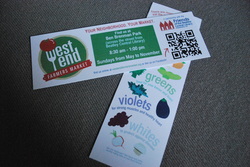 Dramatic lighting! Our 2012 season is over but thanks to our partnership with the Friends of the Beatley Central Library, the fun will go on into the winter! If you've stopped by the Friends' booth any of the past Sundays, you might have picked up this guy, designed especially to keep two very important activities together- eating and reading. If you didn't, download a PDF here! We designed this handy bookmark for many purposes. First, to connect us to our geographical location. We are right across Duke Street from our city's biggest library, and one that sees so much activity. Thousands of people use the Route 236 corridor EVERY DAY to access the highway and get to their schools, jobs, and other places of business. Perpendicular to that is also the Holmes Run Trail, which believe it or not, will get you to Eisenhower Avenue much faster walking than driving. There are at least ten residential towers and apartment complexes which to which it is easily accessible, not to mention all of the area between Seminary Hill and Alexandria West. The Library and the Market are in the perfect location to serve a huge portion of our fellow Alexandrians. Secondly, we believe that eating well doesn't require a fat wallet or a nutritionist. When people are stranded at sea, they begin to crave the things that they need and will skip a fishes' flesh for its liver. Humans instinctively know what's good for them. And you know when you're skimming through Saveur the things that make you drool are usually the most colorful. Haven't you ever been infatuated with a gorgeous Cobb salad? Isn't pico de gallo like the vegetable sprinkles for savory foods? Also, consider the learning opportunities for young kids. Use the bookmark to start teaching colors, or if you're working with someone a little older introduce color theory! Take it to the grocery as a scavenger hunt list. Make spaghetti but then give it sidekick! Maybe something green for a complementary color, or perhaps orange and yellow carrots for a warm color triad. This was made with a focus towards kids but clever parents can always find multiple lessons to teach from one thing. Finally, this is a bookmark. Save the page with tonight's dinner recipe with it. Tuck it in your current novel. Use it at the library while browsing books to mark where you pulled something from so you can return it to the right place. You know what to do. At least once or twice a year, tucked in between a report about two political leaders having a discussion and That Celebeutante's latest brush with the law, there's a wee bitty piece about some foodborne illness outbreak. First, they begin with something to the effect of "Despite encouragement from our mothers to consume more (blank), we might want to steer clear of this particular produce for the immediate future." Then, they go on to very blandly tell us that some cases of salmonella have been reported somewhere and to refrain from eating it until the FDA gives us an all clear, which rarely happens because in two weeks the next scandal has wiped any mention of disease from our minds. 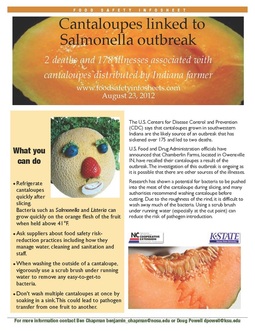 Click image to view Ignorance is definitely not bliss if you fall victim to either salmonella or listeria, two common foodborne illnesses. A recent outbreak which has been linked to cantaloupes has resulted in two deaths this season. Always remember to wash your fruits and veggies before eating them, not only for disease prevention but to get rid of any critters and particulates which may have hitched a ride on your broccoli. Disease isn't harbored only in growing, it can be picked up by improper handling, storage and transport. Before you cut into the last of the summer's melons, give the outside a good scrub (with a scrubber, not your palm). Why? Pathogens can be tracked in by a knife, and that knife can cross contaminate if it is not adequately cleaned. Although tasting fresh produce is part of the charm of farmer's markets, salmonella and listeria flourish in temperatures over 41 C. So, for the sake of everyone's health, we've made this little PSA and hope everyone takes away something more than "AVOID" and learns a thing or two about food safety. Let's play an end-of-summer drinking game you guys. You can play all the time, driving or not, in the morning, at work and the best part is that if you play you win every time. Go down to your local mass retailer, grab the prettiest water bottle you can find and hang on to that sucker all year long. Our drink of choice will be water, the most vital substance to life, and the only side effects* are glowing skin, healthy kidneys and a happy tummy. 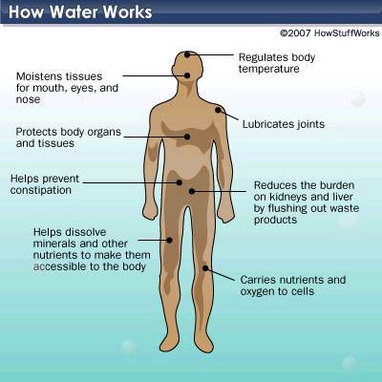 Image from howstuffworks.com First, some reasons to play: A person can live without food for weeks depending on their Body Mass Index. In a starvation scenario, body fat can be burned for energy but once it is expended the muscle mass begins to suffer. And, since many vital organs are muscles, expiration is usually next. Of course, this is assuming the person has access to water. Without it, however, things become far more serious. An average of 1.5 liters is lost daily in bodily fluids. On hot days, that volume accounts only for sweat and if you're not drinking enough, dehydration can set in in a matter of hours. It starts as a mild headache and lack of sweat, things that can can be easily brushed off. But with no water at all even the healthiest person would be in trouble after 4 days, and that's after the nausea, vomiting and shock. Even though water gets more advertising during the hotter months, it is by no means a seasonal beverage. You don't need the famous "eight glasses a day" since eating regular food will cover a chunk of that intake. Just remember that water is a calorie, fat, sugar, and sodium free way to keep healthy, something many other drinks can't say the same about themselves. Before you reach for a cup of coffee in the morning, do like the Italians and grab a glass of water. "But why if coffee is mostly water?" you might ask. Yes, but caffeine is a diuretic which is why every soda hater tells you that those drinks will dehydrate you. When you eliminate fluids, especially after a fast (which sleep is) you are missing some of the water needed to do the things in the above diagram, taxing your body first thing in the morning which won't help the rest of the day run smoothly. "But isn't fluid retention a bad thing?" Fluid retention is often caused by vitamin deficiencies, an excessively salty diet and many medications, and drinking water actually helps to get rid of it. Despite it's commonness, it's a symptom for more serious things as well, so it's not something to be ignored. Let's imagine a latte in the morning, a Coke with lunch, cranberry juice as a healthy refresher and some iced tea with dinner- the water goes right through you and what's left behind are fats from milk, sugars (natural or not) and caffeine. Try this instead: get that fancy pants bottle, fill it and drink some at a stop light, whenever Carly Rae Jepsen is on the radio (which, btw, is all the time), and during other quotidian events. Make up your own rules. Get your youngsters to play with you. Think of the cash saved from the aforementioned list of drinks. Let's say a latte is $2.50, a vending machine Coke and juice total $3.00 and a home-brewed iced tea is $0.50. That's six dollars a day, times five days in a work week, giving you a bonus $30 at the end of each week. Don't touch it for a year and now it's $1560, or a relaxing four day cruise in the Caribbean for two- meals included. That's right. Start now and next summer's vacation is paid for. *Too much of anything, even something as good as water, can be harmful. Don't overdo it or you run the risk of diluting your blood which can be fatal. 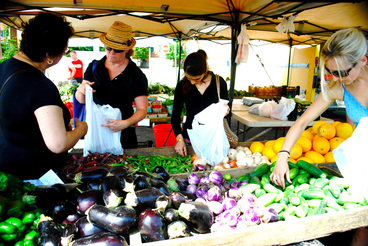 They say that first you eat with your eyes. Food can look wonderful but in the wrong hands, it could be a less than pleasant experience. Even then, in the hands of a professional, lackluster ingredients can't perform the same way that it's gourmet counterparts could. Still, this is only referring to the physical qualities of food, nutritional (and monetary) value is a whole other battle to be waged in the grocery. Yes, ladies and gentlemen. Shopping is a crucial part of food prep, and not just because you need ingredients to cook. Food should not only taste good, it also needs to be good for you. Smart consumerism is often taken to mean getting the most bang for your buck, but as Kerrie Martin, a certified Holistic Health Coach, and Penny Capps, a certified Massage Therapist and Personal Trainer, want us all to know that when it comes to your health quality is far more important than quantity. As a part of their discussion series "Making Food Choices Count", the duo held a casual field trip at our very own market. The group was eager to explore, shop and learn more about the things offered by farmer's markets, as well as the buzzwords attached to them. So, armed with reusable grocery bags and a ton of questions, they got hands-on with their food. 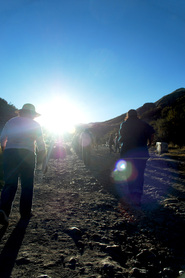 Sensationalist reporting may have scared you into believing that the sun is nothing but skin cancer waiting to strike you and the only way to prevent it is using SPF 100 (which, if you read this article, is really just kind of overkill). In reality, the sun's UV rays are the main producer of Vitamin D, a fat-soluble vitamin which isn't overabundant in nature except in foods high in Omega 3s and those fortified with it such as milk, cereal and good ol' OJ. Vitamin D is largely responsible for the proper mineralization of bone but also promotes the absorption of calcium, also a big contributor to the skeletal system. In the 19th century, studies were performed on patients with rickets and found that doses of cod liver oil, the best edible source of Vitamin D, were able to reverse the effects of the disease and in 1930 milk began to be fortified with it. With that, rickets, which was known for its telltale bone deformation, became as irrelevant to the modern world as scurvy. Whenever cases are reported today it is usually in people who spend a majority of their day indoors (homebound individuals, office workers, video gamers), and those with darker skin as the higher levels of melanin block some absorption of the sun's rays. A recent study published by Kaiser Permanente has also shown that women over 65 who had insufficient levels of Vitamin D tended to gain more weight than those who kept their Vitamin D at adequate levels as they aged.
Now don't get us wrong; we are in no way promoting gallivanting about in the sun all day- you don't need much exposure to get your fill and besides, sunburns and melanoma are serious reasons to refrain from such activities- nor are we defaming the name of sunscreen (in fact, sunscreen is the only "beauty" product which does prevent premature aging and it should be a part of everyone's daily toilette). But you remember how overuse of hand sanitizer bred super resilient bacteria, right? If the infamous "they" are saying something, it's probably as fact based as a rumor. Do your research too. Don't forget "everything in moderation", protect yourself and especially kids who are more susceptible to sun damage, and absolutely do enjoy your time outdoors this summer. Too often, skin care is placed under the umbrella of "Beauty" rather than "General Health". Skin, however, is the body's largest organ and the first line of defense for the rest of them. It is able to convey the goings-on of your insides by becoming warm if you are fighting and infection, developing a rash to alert of an allergy, etc... Yes, even the unsightly zits that "totally ruined high school" were little notices from your epidermis that the potato chip diet wasn't the most nutritious and to maybe grab an orange instead. Despite the aesthetic issues which take precedence a lot of the time, do remember all those times your skin has let you know what was up and devote some of the same attention given to your heart, liver or lungs. Especially now as the sunny weather becomes a bigger part of our leisure time, take a moment to reflect on how well you treat your skin considering how hard it works for you. So, after you find a gift for your dad or grad, pick up a little something for that special layer of cells which will take the heat for you while you're at the beach. |
West End Farmers Market
|
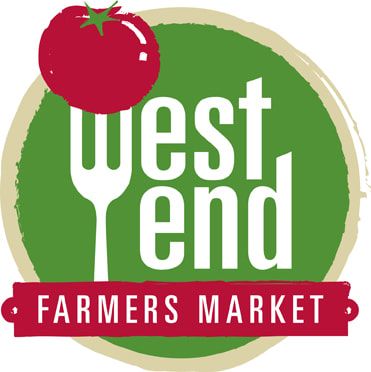

 RSS Feed
RSS Feed
